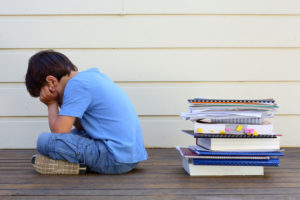 Exclusion from school, such as through suspension or expulsion, is correlated with psychological distress and increased risk of long-term mental health issues, according to a study published in the journal Psychological Medicine. The study also found children with mental health issues are more likely to experience school exclusion.
Exclusion from school, such as through suspension or expulsion, is correlated with psychological distress and increased risk of long-term mental health issues, according to a study published in the journal Psychological Medicine. The study also found children with mental health issues are more likely to experience school exclusion.
School Exclusion and Mental Health Issues
For the study, researchers gathered data on more than 5,000 children who participated in the 2004 British Child and Adolescent Mental Health Surveys, and in the 2007 follow-up. The study included data on school exclusion and on symptoms of mental health conditions such as depression, attention deficit-hyperactivity (ADHD), and anxiety.
Classroom behavioral issues were the most common reason for school exclusion. Children with learning difficulties and mental health diagnoses were more likely than other kids to be excluded from school.
Exclusion from school was correlated with an increase in mental health and learning issues. Three years later, children who had been excluded from school were more likely to have mental health issues. This suggests even a one- or two-day exclusion from school can have long-term psychological consequences.
The study found children living in socioeconomically deprived families and those in poor health were also more likely to be excluded from school. Previous research has found some groups are disproportionately excluded from school. Black children are almost four times more likely than white children to be suspended from school. In the 2013-2014 school year, 18% of black boys and 10% of black girls were suspended from school. This is compared to 5% of white boys and 2% of white girls.The Consequences of School Exclusion
The study’s authors say being excluded from school can be a significant disruption in the lives of children and parents. Though exclusion might seem like a short-term punishment, its effects can extend far beyond the time of the suspension.
Some research has found school suspensions disrupt a school’s culture and may stigmatize excluded children. According to the 2014 Policy Statement on Expulsion and Suspension Policies in Early Childhood Settings, a joint project of the U.S. Department of Health and Human Services and U.S. Department of Education, students who are excluded from school may be as much as 10 times more likely than other students to drop out of high school.
References:
- Exclusion from school can trigger long-term psychiatric illness. (2017, August 29). Retrieved from https://www.sciencedaily.com/releases/2017/08/170829124507.htm
- Ford, T., Parker, C., Salim, J., Goodman, R., Logan, S., & Henley, W. (2017). The relationship between exclusion from school and mental health: A secondary analysis of the British Child and Adolescent Mental Health Surveys 2004 and 2007. Psychological Medicine, 1-13. doi:10.1017/s003329171700215x
- Spears, V. H. (2015, January 20). Kentucky study suggests that out-of-school suspensions can hamper even unpunished students. Retrieved from http://www.kentucky.com/news/local/education/article44548170.html
- Suspended progress: The harms of suspension and expulsion [PDF]. (2016, May). JustChildren.
- Toppo, G. (2016, June 7). Black students nearly 4x as likely to be suspended. Retrieved from https://www.usatoday.com/story/news/2016/06/07/black-students-nearly-4x-likely-suspended/85526458/

The preceding article was solely written by the author named above. Any views and opinions expressed are not necessarily shared by GoodTherapy.org. Questions or concerns about the preceding article can be directed to the author or posted as a comment below.


 Is Your Child Emotionally Ready for College? Tips for Parents
Is Your Child Emotionally Ready for College? Tips for Parents Back-to-School Tips: Preparing Your Child for a Successful School Year
Back-to-School Tips: Preparing Your Child for a Successful School Year Emotional Regulation and Children, Part 2: Boundaries and Tantrums
Emotional Regulation and Children, Part 2: Boundaries and Tantrums

Please fill out all required fields to submit your message.
Invalid Email Address.
Please confirm that you are human.
Leave a Comment
By commenting you acknowledge acceptance of GoodTherapy.org's Terms and Conditions of Use.